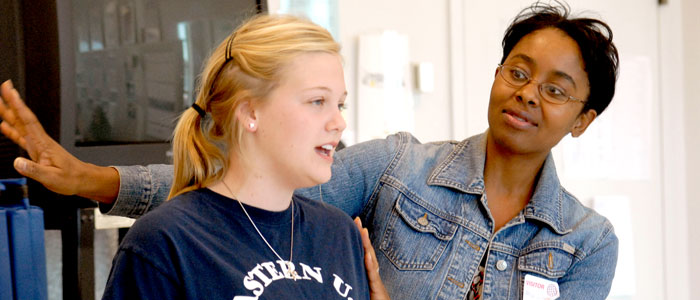“Tell me what you liked,” Dr. Marcia Porter said to the young vocal student who had just performed. “Well, I liked the acting,” she replied.
“That’s all? I’ll tell you what I liked” said Dr. Porter. “I liked the through line, the German diction was really good, and yes, I liked the acting or what we call character.”
“When you are analyzing your work, go with what you liked first. That will encourage you. There will always be 101 things you didn’t like and two things you did. But give yourself something positive to build on.”
Dr. Porter, who is Assistant Professor of Voice at Florida State University, has built a career on international concert, recital and opera stages since graduating first from NOCCA, then Northwestern University (BA and MA) and the University of Michigan (where she earned her doctorate in voice and studied with famed Metropolitan Opera singer Shirley Verrett).
In her solo career, she has presented premier performances of Elegy for a Great Person (European premier), Paul Laurence Dunbar: Common Ground (Dayton Opera), and The Widow’s Lantern (Pensacola Opera). Other roles have included Mrs. Hayes (Susannah), Pamina (The Magic Flute), Princess Elisa (Paganini), Lucy (Treemonisha), and Mimi (La Bohème). She has also recorded works for soprano and orchestra by Antonio Rosetti for the German record label Classic Produktion Osnabrück scheduled for release in 2010.
But it was in her role as inspirational master artist that she worked with NOCCA vocal music students over a three-day workshop, covering a range of techniques from breathing, posture, relaxation, projection, and understanding the emotion and meaning of their songs.
“Your jaw is shaking when you sing,” she pointed out to one young tenor. “You’re making this face,” she asked, “because you’ve heard this before, right?” The young man answered yes.
“Your neck comes out as you take a breath, then goes back in afterwards. Have you noticed this?” she asked another young soprano. To help her solve this, Dr. Porter had the vocalist stand with her back and head against a door. “Now sing with your head constantly touching the door.”
“Schumann did not intend for the middle to move so slow. Let’s try again and move the middle, cook with gas,” she implored another young soprano.
“As singers we have to be comfortable taking up space,” she expressed to a soprano who stood tensely while singing. “Take a step out for balance. If you’re taking up time and space, you might as well make it interesting.”
“I like to watch sports players. You know how they get their game faces on,” she explained to a tenor who was struggling with telling the story of his song. “Their faces tell me where they want to go. I want to see in your face where you want to go. You want to see the end of the phrase.”
But she returned again and again to the students’ goals. “If you are going to audition for college, you have to show us that you know what you are singing about, we won’t pull it out of you.
“And you want to start thinking about your grades, ACT and SAT scores now. Don’t get senioritis. Focus hard as freshman. You might pass a college music program’s audition but not get into the university because you didn’t meet its grade standards. It is one of the most disappointing things to me as a professor to see a talented singer kept out because of grades. So work hard!”

